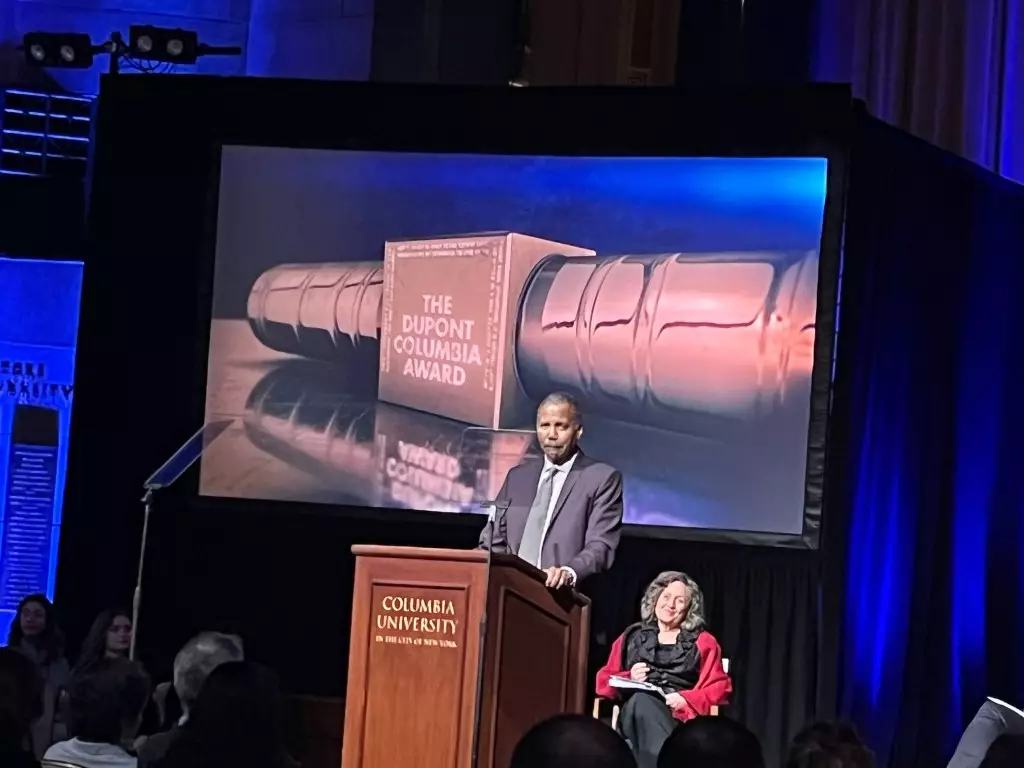In a landmark moment for media, three streaming platforms—Netflix, Max, and Paramount+—have collectively earned the prestigious duPont-Columbia Awards in the same year, a first for the streaming landscape. This annual ceremony, likened to the Pulitzer Prizes for broadcast journalism, exemplifies a significant shift in the medium’s credibility and impact in an increasingly digital era. Hosted by Bill Whitaker of 60 Minutes and NPR’s Steve Inskeep, the awards were presented on Wednesday night at Columbia University’s renowned Graduate School of Journalism, highlighting the contributions of both established institutions and emerging digital players.
This year, the streaming giants led the awards tally, shining a light on their growing role in producing impactful journalism. Notably absent from the list of winners were traditional news powerhouses like Frontline and CNN, suggesting a broader evolution within the media landscape, where conventional outlets may need to reassess their strategies to remain relevant. The diverse pool of winners underscores the changing model of storytelling, where documentaries and series tackle pressing social issues with innovative approaches, impacting public discourse in unprecedented ways.
As the ceremony proceeded, the air was thick with a sense of urgency concerning the state of journalism. During his remarks, Whitaker pointed to a “fraught time for journalism” marked by increasing hostility and skepticism from the public. He invoked the perilous climate for journalists globally, where their very lives are endangered by ongoing wars and oppressive political regimes. Locally, he lamented the treatment of journalists as “enemies of the people” by prominent figures, a phrase that has alarmingly gained traction in political rhetoric.
Whitaker’s call to action resonated deeply; he urged journalists to persist in their pursuit of truth, integrity, and public accountability. His impassioned plea reflects a growing concern among journalists and media analysts about the erosion of trust in the media and the responsibilities news organizations hold in fostering informed citizenry. The concept of journalism serving the public interest has never been more critical, especially when audiences are increasingly fragmented and skeptical.
Among the award-winning projects that received accolades were compelling documentaries that addressed issues of race and social injustice, a testament to the importance of these themes in contemporary America. Highlights included Netflix’s “You Are Not Alone: Fighting the Wolfpack” and Paramount+’s “Birthing A Nation: The Resistance of Mary Gaffney,” both of which underscore the ongoing struggle for equality and representation. It’s noteworthy that five Silver Batons were awarded to initiatives chronicling significant historical events that shaped the narrative around race in the U.S., underscoring how essential these discussions are in our current socio-political climate.
ProPublica and NPR also received recognition for their insightful coverage of international crises and local atrocities that often evade mainstream media attention. The expanding recognition of streaming services and non-traditional outlets reflects a pivotal shift in how audiences consume news, with a growing appetite for in-depth storytelling that transcends traditional reporting protocols.
The ceremony also heralded the emergence of first-time honorees such as The Outlaw Ocean Project, which received accolades for its eye-opening investigative series, “China: The Superpower of Seafood.” By focusing on vital environmental issues through a journalistic lens, the project exemplifies a new breed of journalism that piques public interest while holding power accountable. Similarly, Scripps News was recognized for its deep investigations into critical public safety issues, illustrating the fusion of journalistic rigor and social concern.
Additionally, local news stations took home awards, illustrating that impactful journalism is not confined to major national platforms. Outlets like WTVF-TV and KPRC-TV received recognition, reminding us of the valuable service local journalism provides in reinforcing democratic principles at the community level.
The 2025 duPont-Columbia Awards served not only to celebrate high-quality journalism but also as a poignant reminder of the resilience necessary to operate within today’s complex media environment. As the landscape shifts, journalism must adapt and innovate, ensuring its role as a cornerstone of democracy. In a world rife with misinformation and divisive rhetoric, the prominence of these awards highlights the vital importance of credible reporting in nurturing a well-informed populace. As we move forward, it is essential to elevate the standards of journalism, providing the public with fact-based narratives that foster understanding and inclusivity in an increasingly polarized society.
